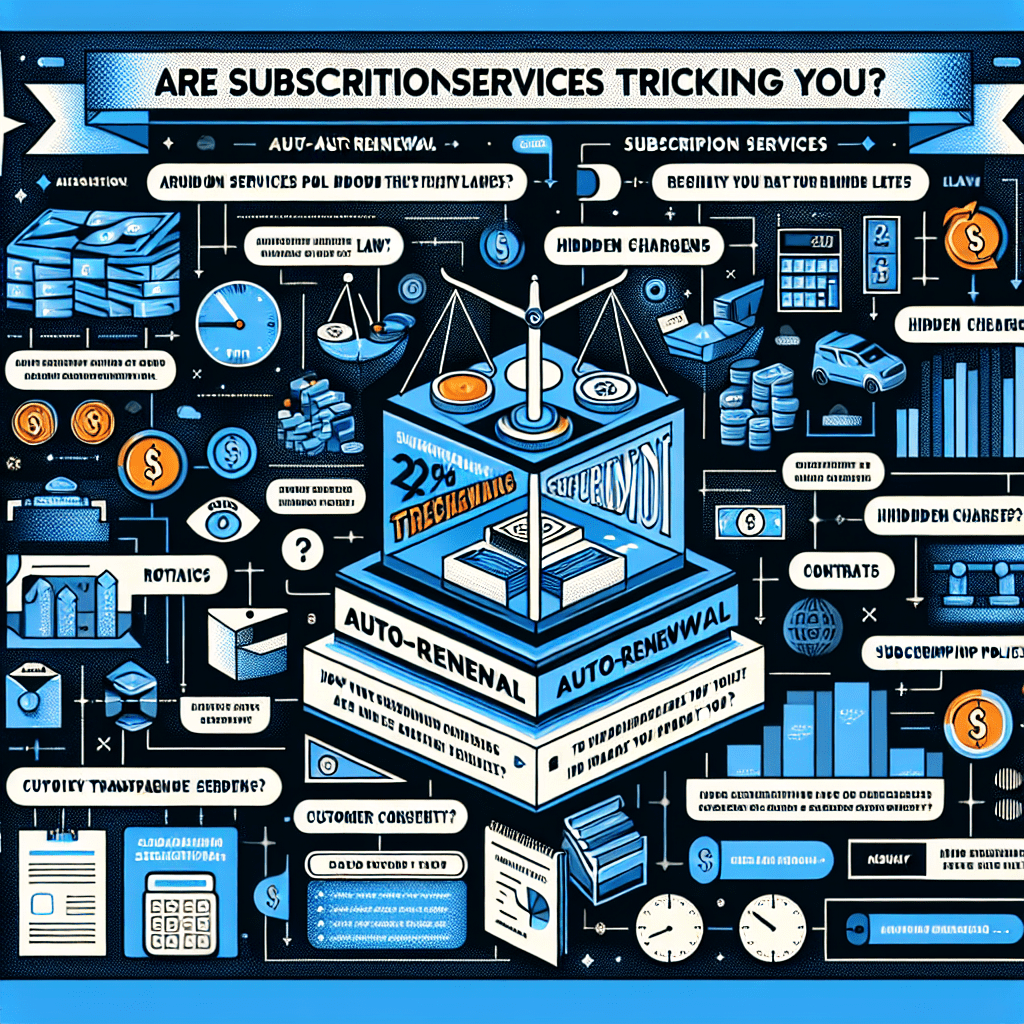“Are Subscription Services Tricking You? Know Your Rights on Auto-Renewals!”
Hidden Fees And Fine Print: How Subscription Services Exploit Auto-Renewals
Subscription services have become an integral part of modern consumer culture, offering convenience and access to a wide range of products and services. However, many consumers find themselves unknowingly trapped in auto-renewing subscriptions, often due to hidden fees and complex terms buried in the fine print. While these practices may seem deceptive, they are not always illegal. Understanding how subscription services exploit auto-renewals and what legal protections exist can help consumers make more informed decisions.
One of the most common tactics used by subscription services is the strategic placement of auto-renewal clauses within lengthy terms and conditions. Many consumers sign up for free trials or discounted introductory offers without realizing that they are also agreeing to automatic renewals at full price once the promotional period ends. Companies often rely on the assumption that customers will either forget to cancel or fail to notice the renewal charges on their bank statements. This practice, while frustrating, is generally legal as long as the company provides clear disclosure of the terms at the time of enrollment. However, the problem arises when these disclosures are intentionally vague or difficult to find.
In addition to unclear terms, some companies make the cancellation process unnecessarily complicated. Instead of allowing customers to cancel with a simple click, they may require multiple steps, such as calling customer service, submitting written requests, or navigating through a series of confusing web pages. This tactic, known as “dark patterns,” is designed to discourage cancellations and prolong subscriptions. While some jurisdictions have started cracking down on these practices, many companies continue to exploit consumer inertia to maximize profits.
Another way subscription services take advantage of auto-renewals is through hidden fees. Consumers may sign up for what appears to be a low-cost subscription, only to later discover additional charges for processing, premium features, or mandatory add-ons. These fees are often disclosed in fine print, making them easy to overlook. In some cases, companies may even change their pricing structure without adequately informing subscribers, leading to unexpected increases in monthly or annual charges. While businesses are generally required to notify customers of price changes, the manner in which they do so can be deliberately subtle, such as sending an easily overlooked email or updating terms on a website without direct notification.
To address these concerns, consumer protection laws have evolved to regulate auto-renewal practices. In the United States, the Federal Trade Commission (FTC) enforces the Restore Online Shoppers’ Confidence Act (ROSCA), which requires companies to clearly disclose auto-renewal terms before charging consumers. Additionally, some states, such as California, have enacted stricter laws mandating that businesses provide easy cancellation options and obtain explicit consent before enrolling customers in recurring billing. Similarly, in the European Union, consumer protection regulations require transparency in subscription agreements and provide consumers with the right to withdraw from contracts within a specified period.
Despite these legal protections, many companies continue to push the boundaries of what is permissible, often relying on consumer inattention to maintain recurring revenue. To avoid falling victim to these tactics, consumers should carefully review subscription terms before signing up, monitor their billing statements for unexpected charges, and take proactive steps to cancel unwanted subscriptions in a timely manner. By staying informed and vigilant, consumers can better protect themselves from the pitfalls of auto-renewing subscriptions.
Consumer Rights And Legal Protections Against Unfair Subscription Practices

Subscription services have become an integral part of modern consumer life, offering convenience and access to a wide range of products and services. From streaming platforms to meal kits and software applications, these services often operate on an auto-renewal basis, ensuring uninterrupted access for users. However, concerns have arisen regarding whether companies are using auto-renewals to exploit consumers through unclear terms, hidden fees, and difficult cancellation processes. As a result, legal protections have been established to safeguard consumers from unfair subscription practices and ensure that businesses operate transparently.
One of the primary concerns with auto-renewing subscriptions is the lack of clear disclosure regarding renewal terms. Many consumers sign up for free trials or promotional offers without realizing that they will be automatically charged once the trial period ends. In some cases, companies fail to provide adequate notice before charging customers, leading to unexpected expenses. To address this issue, various consumer protection laws require businesses to clearly disclose auto-renewal terms at the time of enrollment. For example, in the United States, the Federal Trade Commission (FTC) enforces the Restore Online Shoppers’ Confidence Act (ROSCA), which mandates that companies must provide clear and conspicuous disclosures about recurring charges and obtain consumers’ express consent before enrolling them in an auto-renewing subscription.
In addition to disclosure requirements, laws also regulate how businesses handle cancellations. Many consumers have encountered difficulties when attempting to cancel their subscriptions, often facing complex procedures, long wait times, or even being required to call customer service despite signing up online. To prevent such unfair practices, several jurisdictions have implemented regulations that require companies to offer easy and accessible cancellation methods. For instance, California’s Automatic Renewal Law (ARL) mandates that businesses must provide a simple online cancellation option if the consumer initially signed up through an online platform. Similarly, the FTC has proposed updates to its rules that would require companies to make the cancellation process as straightforward as the sign-up process, ensuring that consumers are not trapped in unwanted subscriptions.
Another critical aspect of consumer protection against unfair subscription practices is the requirement for renewal reminders. Many consumers forget about their ongoing subscriptions, only realizing they have been charged after the payment has been processed. To mitigate this issue, some laws require businesses to send renewal reminders before charging customers for another subscription period. For example, the European Union’s consumer protection regulations mandate that companies must notify customers before an automatic renewal occurs, particularly for long-term contracts. This ensures that consumers have the opportunity to review their subscriptions and make informed decisions about whether to continue or cancel.
Despite these legal protections, some companies still engage in deceptive practices, prompting regulatory agencies to take enforcement actions. The FTC, state attorneys general, and consumer advocacy groups frequently investigate and penalize businesses that violate auto-renewal laws. In recent years, several high-profile cases have resulted in significant fines and mandatory changes to business practices, reinforcing the importance of compliance with consumer protection regulations.
Ultimately, while subscription services offer convenience, consumers must remain vigilant and aware of their rights. By understanding the legal protections in place, individuals can make informed choices, avoid unexpected charges, and take action if they encounter unfair practices. As regulations continue to evolve, businesses must prioritize transparency and fairness to maintain consumer trust and comply with the law.
How To Cancel Unwanted Subscriptions And Avoid Auto-Renewal Traps
Canceling unwanted subscriptions and avoiding auto-renewal traps can be challenging, especially when companies design their services to make the process difficult. Many consumers find themselves unknowingly enrolled in recurring payments, often due to unclear terms or misleading sign-up processes. While businesses argue that auto-renewals provide convenience, the reality is that they can lead to unexpected charges and financial strain. Understanding how to effectively cancel these subscriptions and protect yourself from unwanted renewals is essential for managing your finances and avoiding unnecessary expenses.
One of the most effective ways to prevent unwanted charges is to carefully review the terms and conditions before signing up for any subscription service. Many companies include auto-renewal clauses in the fine print, which consumers may overlook. By reading the terms thoroughly, you can identify whether the subscription will renew automatically and what steps are required to cancel it. Additionally, some services offer free trials that transition into paid subscriptions if not canceled within a specific period. Setting a reminder to cancel before the trial ends can help you avoid unexpected charges.
If you are already subscribed to a service and wish to cancel, the first step is to locate the company’s cancellation policy. Some businesses make this information difficult to find, requiring users to navigate multiple pages or contact customer support. However, consumer protection laws in many jurisdictions mandate that companies provide clear and accessible cancellation options. In the United States, for example, the Federal Trade Commission (FTC) has taken action against businesses that use deceptive practices to prevent consumers from canceling subscriptions. Similarly, the European Union’s consumer protection laws require companies to offer straightforward cancellation methods.
Once you have identified the cancellation process, it is important to follow the required steps precisely. Some companies allow cancellations through their website or mobile app, while others may require an email request or a phone call. Keeping a record of your cancellation request, such as a confirmation email or a screenshot, can serve as proof in case of disputes. If you encounter difficulties canceling a subscription, contacting your bank or credit card provider to block future charges may be an alternative solution. Many financial institutions offer chargeback options for unauthorized or disputed transactions.
To further protect yourself from auto-renewal traps, consider using virtual or prepaid cards for subscription services. These payment methods limit the amount of money that can be charged, preventing unexpected renewals. Additionally, regularly reviewing your bank statements can help you identify recurring charges and take action if necessary. Some financial apps also provide subscription management tools that notify you of upcoming renewals and allow you to cancel unwanted services easily.
Legislation continues to evolve to address the challenges posed by auto-renewal practices. Governments and regulatory agencies are increasingly holding companies accountable for misleading subscription models. As a consumer, staying informed about your rights and taking proactive steps to manage your subscriptions can help you avoid financial pitfalls. By carefully reviewing terms, monitoring your accounts, and utilizing available tools, you can effectively cancel unwanted subscriptions and prevent auto-renewal traps from impacting your finances.
















